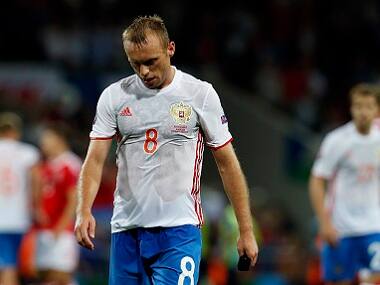When Leonid Slutsky was appointed Russia manager in August, the players were said to be immensely pleased with his arrival. After a tense time under his predecessor Fabio Capello, they thought relief was in store. Indeed, Slutsky oversaw an impressive return to form, as Russia made it to Euro 2016 with relative ease. Players spoke about playing for the manager. Slutsky, who continues to be the boss at CSKA Moscow, was seen as a genial and humble figure in addition to being a great motivator. The Russian Mourinho, they called him. Sadly, his time with the national team, ended early and in not-so-special circumstances. Shambolic is a more appropriate way of characterising the Russia’s campaign, as the team crashed out of Euro 2016 with a 0-3 defeat to Wales. Slutsky announced his resignation soon after. [caption id=“attachment_2846544” align=“alignleft” width=“380”]  Russia’s Denis Glushakov leaves the pitch after his team’s defeat to Wales. AP[/caption] To be fair, the 45-year-old manager was not dealt the best draw. His plans were ravaged weeks before the tournament, with crucial players getting injured, while many others suffered poor form. It’s a measure of the weak resources at Slutsky’s disposal that he was forced to start with Oleg Shatov and Roman Shirokov at different points in the brief campaign despite both of them carrying injuries. But against Wales on Monday, it was his defensive organisation which let him down. To call him the Russian Mourinho would be to pander to careless glorification. Tactics and defensive organisation are not Slutski’s greatest suits. In fact, he is closer in spirit to Carlo Ancelotti. A polished communicator who modifies the system to utilise his side’s strengths. This wasn’t even the first defensive blip from Russia. Vasili Berezutski, who was later replaced by his twin brother Aleksei on their 34th birthday, and Sergei Ignashevich are all worn-out veterans struggling for pace while right-back Igor Smolnikov has a tendency to push too high on the wing. He was joined by Dmitri Kombarov on Monday who did the same, leaving space behind with familiar recklessness. This space was exploited magnificently by Wales. Russia knew that it needed a victory in order to stay in the tournament. The necessity of three points forced Slutsky’s side to push forward in search for goals. However, like against England and Slovakia, it was not until the Russians had conceded that they began enjoying decent spells of possession. But the match had slipped away by then. Within 20 minutes, Wales led by two goals. For both strikes, Russia’s defensive shape was caught in a shape best termed embarrassing. Neil Taylor’s goal summed up the chaos in the Russian defence. The players were caught ball-watching and converged towards Gareth Bale, allowing Taylor ages to make an easy run and score from the rebound despite a tame first shot. Bale and Aaron Ramsey ran rings around the opposition and broke away time and again. In fact, Russia should feel fortunate to lose only by three goals. It could have been a humiliation on the scoreboard. There was little doubt it was a humiliation on the pitch. Russia’s problems with controlling a creative force had been laid apparent by Marek Hamsik’s virtuoso performance in the previous match. Bale proved to be their bane this time around. The Real Madrid star’s dribbling tied the opposition in knots as the Russians could barely keep pace with him. Wales had no less than nine shots on target in the first half. The numbers tell the story of Russia’s abysmal display. The idea of playing Kombarov and Smolnikov as full-backs was to capitalise on the advantage they provide from their crossing ability. In the end though, only one of their 16 crosses found its target. The tall and muscular Artem Dzyuba’s insipid performance in the air exacerbated the issue. Wales skipper Ashley Williams had the measure of the Russian striker all evening. Russia could win only one of the 13 aerial duels in the Welsh half. The counter-attacks that Slutsky’s team had to battle throughout the match could have been managed better if their players had not made poor challenges. Russia won only eight of the 29 tackles they attempted on Monday. Central midfielders Denis Glushakov and Pavel Mamaev, brought into the side at the expense of Aleksandr Golovin and Roman Neustadter, were the worst offenders. The duo regained possession only twice in 12 attempts. No wonder Wales bossed the midfield. Since its 3-0 victory over Lithuania in March, Russia has won only one and lost five of its eight international matches. With the World Cup on its home turf only two years away, the national side is in disarray. The return of Alan Dzagoev will add quality to the midfield but the rest of the areas in the squad need significant improvement. If Slutsky’s resignation is accepted, his replacement will have an unenvious job. Russia has not been at the races in a group that seemed to be set up well for them. Slovakia have four points from three matches and look good in terms of securing a round-of-16 spot. It’s a major indictment of the Russian side that it should come at their expense. Even off the pitch, Russia has not invited positive response, on account of the despicable behaviour of its fans in the opening week of the competition. As the country prepares to welcome the world in 2018, a holistic makeover is an urgent requirement. Russia will need to organise a tournament that leaves memories worth savouring. For, at Euro 2016, the Russians will not be missed.
Since its 3-0 victory over Lithuania in March, Russia has won only one and lost five of its eight matches. With the World Cup on its home turf only two years away, the national side is in disarray.
Advertisement
End of Article


)

)
)
)
)
)
)
)
)



